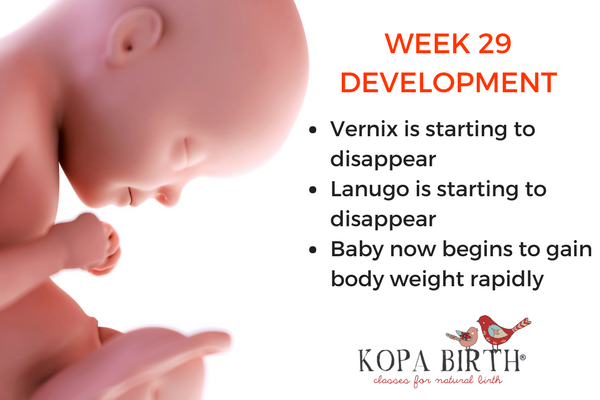
Table of Contents
What’s Happening Inside Your Womb?
At 29 weeks pregnant, your baby is approximately the size of a butternut squash. The baby’s length is now around 15.2 inches and weighs around 2.5 pounds. At this stage of development, your baby is still growing and maturing, and there are many changes happening inside your womb.
One of the most significant developments at this stage is the baby’s brain growth. The baby’s brain is growing rapidly, and the nerve cells are developing at a faster rate than the surrounding tissues. The baby’s brain is also becoming more complex, with more recognizable structures such as the cerebellum and cerebral cortex. This growth will continue to increase over the next few weeks, leading to a more developed and functional brain.
Another important development at 29 weeks is the baby’s lungs. The lungs are still developing, but they are now more fully formed than they were a few weeks ago. The baby is now inhaling and exhaling small amounts of amniotic fluid, which is helping the lungs to grow and develop. The baby’s lung development will continue until the time of birth, with the lungs only reaching full maturity when they are needed to breathe air.
Your baby’s senses are also developing at 29 weeks. The baby’s eyes are now fully formed, and the baby can see light filtering into the womb. The baby’s sense of taste is also developing, and the baby can now taste the amniotic fluid that surrounds them. The baby’s hearing is also improving, and they can now hear sounds from outside the womb, such as your voice and external noises.
What You Can Expect at 29 Weeks Pregnant
At 29 weeks pregnant, you are likely to be experiencing a range of physical symptoms. You may be feeling more tired than usual, as your body is working hard to support the growing baby. You may also be experiencing back pain, headaches, and heartburn, as well as swelling in your feet and ankles.
It’s important to take care of yourself during this time, getting plenty of rest, eating a healthy diet, and staying hydrated. You may also want to consider prenatal yoga or other gentle exercises to help you stay fit and flexible.
FAQs About Baby Development in Womb at 29 Weeks
1. Can my baby hear me at 29 weeks?
Yes, your baby’s hearing is developing at 29 weeks, and they can hear external sounds, including your voice.
2. When will my baby’s lungs be fully developed?
Your baby’s lungs will continue to develop up until the time of birth, with full maturation occurring when the baby is born and begins to breathe air.
3. What should I eat to support my baby’s development at 29 weeks?
A healthy, balanced diet that includes plenty of fruits, vegetables, whole grains, lean protein, and healthy fats can help support your baby’s development at 29 weeks.
4. How can I relieve back pain at 29 weeks pregnant?
You may be able to relieve back pain by practicing good posture, taking regular breaks to stretch and walk, using a pregnancy pillow, and getting regular prenatal massages.
5. When will I start to feel my baby moving at 29 weeks?
If you haven’t already, you should begin to feel your baby moving regularly at 29 weeks. Your baby may have regular periods of activity and rest, and you may notice certain movements, such as kicks and rolls, that are becoming more distinct.
In Conclusion
At 29 weeks pregnant, your baby is growing and developing at a rapid pace. The baby’s brain, lungs, and senses are all continuing to mature, and you may be experiencing a range of physical symptoms as your body adjusts to support the growing baby. By taking care of yourself and staying informed about your baby’s development, you can help support a healthy pregnancy and prepare for the birth of your little one.
